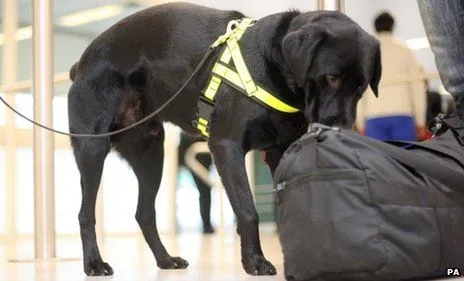The Ministry of the Interior has resorted to the use of sniffer dogs at the airport and cargo checkpoints following the breakdown of key narcotics detection scanners, which poses a critical threat to the country’s fight against drug trafficking.
Responding to a parliamentary question from the Member of Parliament for Assin South, Rev. John Ntim Fordjour, the Minister for the Interior, Muntaka Mohammed Mubarak, acknowledged the operational failures and assured the House that efforts are underway to procure state-of-the-art scanners to restore effective surveillance and narcotics detection at ports of entry.
“Body and baggage scanners are vital tools in the frontline operations of the Narcotics Control Commission (NACOC), especially at airports where concealment tactics have become increasingly sophisticated. Unfortunately, due to severe technical issues and the unavailability of critical components, past attempts to repair the scanners have failed,” the Minister said.
Also Read: U.S. joins investigation into Sapeiman counterfeit dollar and gold bar haul
As a stop-gap measure, the Minister revealed that trained sniffer dogs are currently being deployed to identify and intercept illicit substances.
The Minister emphasized that a cost-benefit analysis by the Ministry had determined that acquiring new, advanced scanners would be more effective and sustainable than attempting to repair the outdated ones.
“Modern scanners are embedded with robust detection technology. That is why, under the Security Sector Retooling Programme, we’ve made a dedicated budgetary provision to procure these scanners. They will not only enhance NACOC’s operations but align Ghana with global best practices in narcotics detection and airport security,” Mr. Mubarak said.
He assured Parliament that the Ministry is working closely with international partners to mobilize donor support and fast-track the procurement process.
Responding to a follow-up question on the urgency of installation, the Minister acknowledged the risks involved in allowing narcotics to transit through Ghana’s ports but stressed that procurement processes have to be followed.
He also stressed that the scanners would aid in detecting not only drugs but also other contraband items, including illegally smuggled gold and goods.
The revelation comes at a time when concerns are mounting over Ghana’s potential vulnerability as a transit hub for narcotic substances, given the growing sophistication of trafficking networks and technological lapses in surveillance.
Parliamentarians welcomed the Minister’s transparency but urged accelerated procurement to seal any security lapses at the country’s ports of entry.


